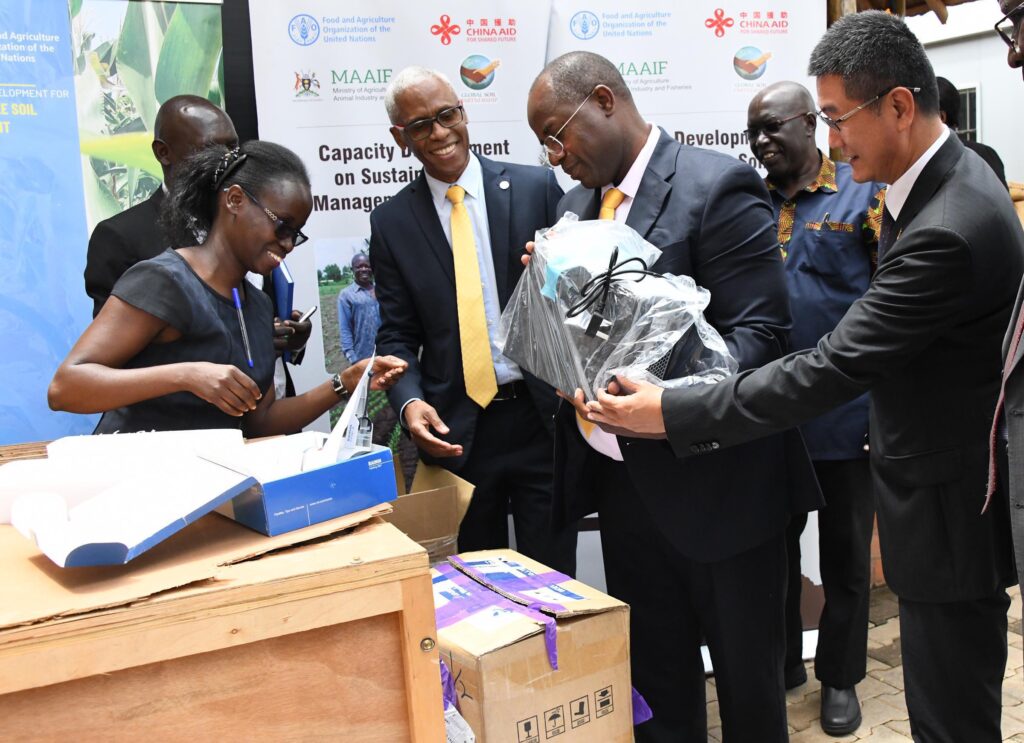By Nelson Kiva
The rate at which nutrients in Uganda’s soil are being depleted is worrying experts.
As a result, experts argue that the country’s food production faces uncertainty since Uganda’s soil remains a key medium of food production. Uganda and most parts of Africa are yet to migrate to modern technologies of food production other than soil.
The commissioner for crop production at the agriculture ministry, Alex Lwakuba, said God’s resource of fertile soils to Ugandans has been abused.
“We have continued to cultivate the soils with less or no remedial activities. We have left our soils to degrade. In areas like Rakai, Luwero, Kayunga, Iganga, Bugiri, Ngora and Kumi, among others, there are indicators of negative nutrient balances,” he said.
He made the remarks during the handover of soil-testing equipment worth sh453.2m to the Government by the Chinese Embassy in Uganda and the Food for Agriculture Organisation (FAO), at the FAO offices in Kampala, yesterday.
The 12 pieces of equipment, included a laboratory drying oven for soil analysis, a first-grade steel mobile soil storage cabinet, a temperature-controlled far infrared digestion furnace and an automatic Kjeldahl soil analyser. The others were a pump suction system, chemical fume hood, an automatic dispenser, automatic scrubber and soil rotators
Negative nutrient balances, Lwakuba said, are signs of unsustainable agricultural production and that the country cannot deliver on its aspirations for sustainable food security.
“We are threatened by food scarcity and it comes with an impact on human development. The cognitive abilities of our children at school are affected if the food we are eating does not address balanced diet diversities,” he said.
President Yoweri Museveni, in 2014, directed the agriculture ministry to come up with strategies of intervention after he observed stunted crops on his way from eastern Uganda. Through joint efforts with FAO and other stakeholders, the Government came up with a project dubbed ‘Capacity Development on Sustainable Soil Management for Uganda.’
The project is financed by the Chinese government and it was under the same arrangement that the equipment was donated.
The project, according to the country FAO representative, Dr Antonio Querido, was designed to strengthen the capacity of public and private institutions and communities to sustainably manage natural resources, restore degraded lands and protect vital ecosystems.
“Although soil is a vital resource, few efforts have been engineered to improve its fertility, promote its health and increase food security. According to the National State of Environment Report (2018-2019), Uganda’s soil fertility is declining. In light of this, the sustainable management of soil resources and production of food crops is essential,” Querido noted.
He said the laboratory items were procured for the National Semi-Arid Resources Research Institute based in Serere under the National Agricultural Research Organisation.
The First Secretary at the Chinese Embassy in Uganda, Wang Chenxu, who represented Chinese Ambassador Zhang Lizhong, commended Uganda’s commitment to the China-Uganda South to South Co-operation (SSC) project, saying it has helped improve people’s standards of living through increased agricultural productivity.
The SSC programme is part of FAO’s initiative to improve food security in poor households. Since the launch of the programme in 1996, China has played an active role in it.
“One of the ongoing co-operation arrangements is FAO China-Uganda SSC project phase III in which China sends agricultural experts and technicians to Uganda to share knowledge and skills with smallholder farmers to boost production and household incomes,” Chenxu said.
The first two phases, which were implemented from 2012 to 2014 and from 2016 to 2018, respectively, benefited over 10,000 small-scale farmers.
Agriculture state minister Fred Kyakulaga commended China and FAO for their support. He said the Government is preparing a soil policy to, among others, address soil degradation.






